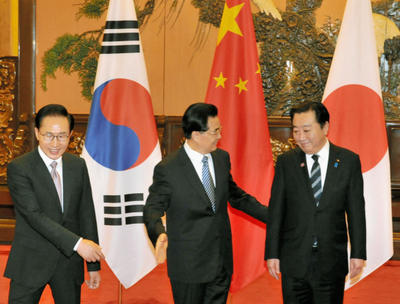The legacies of colonialism, international wars and civil conflicts persist, thwarting any attempts to rebuild trust and achieve multilateral cooperation.
The creation of a network of FTAs between the neighbouring states could serve as a confidence-building mechanism toward deepening regional integration in East Asia, but efforts have been lagging. Japan and China have yet to enter talks for a bilateral FTA. South Korea and Japan suspended negotiations for a bilateral FTA in 2004 and have made little progress since. This year Seoul has agreed with Beijing to start negotiations for a bilateral FTA, and the first session took place in Beijing on 14 May.
The trade ministers of South Korea, Japan and China for the first time agreed to launch negotiations for a three-way FTA by the end of this year. South Korean president Lee Myung-bak met in Beijing with Chinese premier Wen Jiabao and Japanese prime minister Yoshihiko Noda for annual summit talks, where they discussed the future of tripartite economic cooperation. The three leaders shared the view that a trilateral FTA would boost trade and investment among the three countries and provide a framework for comprehensive and structural cooperation.
But at the press conference after the summit, President Lee looked less enthusiastic than his Chinese and Japanese counterparts. Lee said the trilateral FTA would be meaningful to the countries’ future, but avoided answers regarding the possibility of concluding the FTA negotiations within two years. Also further undermining confidence among the three countries, Chinese president Hu Jintao refused to meet with Japanese prime minister Yoshihiko Noda without any explanation. Speculators have suggested Hu’s cancellation may have been triggered by the heated debate on 13 May between Chinese premier Wen Jiabao and Noda over the sovereignty of the disputed Diaoyu/Senkaku Islands, or Japan’s granting of a visa to Uighur leader Rebiya Kadeer to run the World Uyghur Congress in Tokyo.
The three leaders also discussed the continuing North Korean provocations, but the absence of North Korea in these negotiations was conspicuous. A successful regional FTA could allow products produced in North Korea to be freely sold in South Korea and Japan, helping its flagging economy. Similarly, the lack of consumer goods in North Korea could be rectified by an influx of quality products from South Korea and Japan. But for ideological reasons this opportunity remains closed for North Korea.
It is no coincidence that just days prior to the trilateral summit in Beijing, the president of North Korea’s Presidium of the Supreme People’s Assembly, Kim Yong-nam, went for his first foreign trip since the death of Kim Jong-il. But rather than heading to China, he went to Southeast Asia where he met with the president of Singapore, Tony Tan, and the city-state’s parliamentary leader, Michael Palmer. Kim Yong-nam was accompanied by Ri Kwang-gun, who heads the Joint Venture and Investment Commission, and An Jong-su, the minister of light industry. Obviously, North Korea is trying to attract foreign investment by offering itself to manufacturers interested in cheap labour, and to boost exports of its own consumer products and minerals. In Singapore the leaders discussed a variety of issues, including the situation on the Korean Peninsula and bilateral relations, but President Tan and Mr Palmer stressed that while Singapore was open to advancing bilateral relations with North Korea, they were constrained by the fact that North Korea remains subject to UN Security Council sanctions.
The following day, Kim Yong-nam flew to Indonesia, where he also drummed up support for foreign investment. Most Western multinational companies avoid direct business with North Korea because of US trade embargoes. Washington has warned financial institutions in Southeast Asia that they should not do business with North Korea. Banks in Macao and Singapore stopped doing business with North Korea several years ago. Given this backdrop, what is the reaction of Indonesia to such pressure?
Indonesian president Susilo Bambang Yudhoyono called for dialogue to resolve problems on the Korean Peninsula, while Foreign Minister Marty Natalegawa suggested that isolating North Korea further was not a constructive solution. When discussing the issue of the controversial rocket/satellite launch, Yudhoyono underlined that misunderstandings should be avoided through dialogue and communication. Kim Yong-nam was assured that there are areas where cooperation is possible. For example, the two leaders resolved to raise bilateral political relations by promoting visits by officials, ministers, managers and media professionals of the two countries. The media swap deal will allow networks in both North Korea and Indonesia to share content and participate in journalist exchanges.
North Korea is clearly trying to curb its excessive reliance on China by reaching out to other countries in Asia. But how many countries can or will help North Korea integrate successfully? Why should North Korea look for partnerships away from its own region? Would it not be more logical to improve relations with its immediate neighbours, namely South Korea and Japan? Is the US or Russia willing to see the three countries build a genuine free-trade platform in the region? The combined population of the three major Asian powers is around 1.5 billion people, with an aggregate GDP of US$15 trillion or 20 per cent of the world total. The establishment of a multilateral FTA would definitely help lay a foundation not only for a strong economic partnership, but also for trust, reconciliation and reliable peace in the region.
But developments over the last week have shown once again that domestic affairs appear to carry more weight for national leaders than regional projects. The disputes of the 20th century continue to affect the hearts and minds of politicians in the two Koreas, China and Japan. And it may take longer than expected before regionalism in Northeast Asia will prevail over political mistrust and economic protectionism.
Leonid Petrov is Lecturer in Korean Studies at the Faculty of Arts and Social Sciences, University of Sydney.

